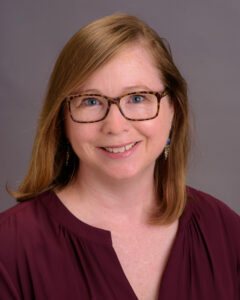Dr. Kerri Nowell’s experiences with disability began early in her life. Growing up as one of six children, Nowell’s younger brother was born with a hearing impairment. Nowell credits these early experiences with helping develop her passion for working with children with disabilities.
After growing up in Oman and moving to the United States to attend college, Dr. Nowell spent years working in schools as a school psychologist before pursuing her doctorate in school psychology. Those years of work with autism created an interest, and a later a passion, in Dr. Nowell for researching developmental disorders and how they affect children.
Now that she is on faculty at the Thompson Center, Dr. Nowell splits her time between her clinical work, where she assesses and diagnoses children with autism and other neurodevelopmental disorders, and her research.
Dr. Nowell currently is exploring three different research areas: behavioral phenotyping, demographic factors and autism, and young adults with autism and their co-occurring symptoms. Phenotyping involves using multiple sources of information to describe specific characteristics of a child with autism. Dr. Nowell says this could help determine what types of treatments work best for which kids.
“While it is certainly true that every child with autism is different, there is evidence suggesting that we may be able to identify subgroups of children based on shared characteristics,” Nowell said. “If we can accurately categorize these symptoms and identify which category a specific child might tend to lean toward, we may be more easily identify the most effective types of treatment for each specific child, rather than having to try many different things before finding what works.”
Dr. Nowell also is exploring different demographic factors and how they affect autism and autism diagnosis. She is specifically interested in gender differences in autism and how those differences might affect diagnosis and treatment for girls with autism.
“Because autism seems to affect boys much more often than girls, several of our existing diagnostic tools focus on male behaviors that perhaps girls with autism don’t exhibit,” Nowell said. “However, there might be more gender-specific behaviors that girls exhibit that are associated with autism that we miss because we are used to looking for behaviors that boys are more likely to show. It is important to identify these female behaviors that may be linked to autism in order to ensure that girls aren’t going undiagnosed.”
Other demographic factors Nowell is exploring include how minority and low-income families access treatment for autism and as well as how what kinds of treatment decisions are made by low-income families and whether those decisions differ from families with higher incomes.
Finally, Dr. Nowell is working to identify and study additional health issues that may affect young adults who also have autism, such as catatonia, anxiety and depression. She currently is the principal investigator on a grant from the Sears Foundation to study the reliability of a catatonia scale developed by Dr. Judith Miles, a long-time Thompson Center researcher.
While Dr. Nowell’s research interests are broad, her work is targeted toward the same goal: to discover the best ways to identify, care for and support people and families with autism.


